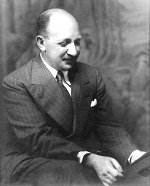 Jacobi
was not one for ethnic accents so do
not expect a Bloch epigone. Rather he
seems to trace his musical bloodline
back to the great romantics - Brahms
and Schumann.
Jacobi
was not one for ethnic accents so do
not expect a Bloch epigone. Rather he
seems to trace his musical bloodline
back to the great romantics - Brahms
and Schumann.
Frederick Jacobi is
not quite a stranger to CD. CRI issued
a collection of archive recordings during
the 1990s. Both the cello concerto and
the Hagiographa were on that
disc. All CRI discs have now been deleted
now though you may be able to pick this
one up on ebay.
Jacobi was born in San Francisco of
German Jewish parentage. He studied
in Germany and rose to prominence especially
as a teacher whose pupils included Ward,
Starer and Dello Joio.
The Concerto is an explicitly
devotional piece with each of its three
movements based in sequence on psalms
90, 91 and 92. The work communicates
as a personal prayer with the listener
eaves-dropping on this intimate act
of faith. It dates from 1932 written
in Switzerland and revised in 1950 in
Gstaad. Good to see the soloist Gerhardt
putting in an unexpected experience
here after his fine recording for Chandos
in their Hickox series of the orchestral
music of Frank Bridge. Jacobi’s music
is intimate and not desperately dramatic
or varied across the three movements
although the mood becomes more animated
and jaunty in the finale.
In 1930 working with
the help of Lazar Saminsky, Jacobi wrote
a full length Sabbath evening service
of which we hear four excerpts extremely
well performed by baritone Patrick Mason
with the choir conducted by Joseph Cullen.
It is an accessible piece, not specially
ethnic in its accent and in truth it
would fit with little discontinuity
into an English Cathedral Service. The
Ahavat olam kicks this trend
being resolutely and most impressively
Jewish in flavouring. Robert Bloch,
the Cantor sings with enviable engagement
and evident conviction.
Hagiographa
is a chamber work for piano quintet
in three movements portraying Job Ruth
and Joshua. It works extremely well
even more so than the Concerto. The
dramatic contours of the piece and the
quality of its ideas is high. This is
not at all like Bloch. It is tonal,
melodious and dramatic, not specially
florid but somehow emotionally tense.
After the high tension of the Job movement
we turn to the lengthy central ‘panel’
which portrays Ruth in sweetened pastoral
terms - sympathetic, loving and calm.
For a moment at 1.38 there is some Hassidic
flavouring but this arises naturally
from the progress of the music rather
than seeming grafted on.. The finale
is the explosive Joshua, speaking of
conflict and occasionally dashing away
with Mussorgsky's unhatched chicks.
The CD ends with Two Pieces in
Sabbath Mood for orchestra.
Here the composer Samuel Adler (whose
own music could not be more different
from Jacobi's) conducts the Slovak Radio
Symphony Orchestra in this tonal piece.
Kaddish is the first item (brief
downbeat and easy with organ-loft calm)
and Oneg Shabbat the second.
Oneg Shabbat is grave and melodramatic
with some of the slow deliberate blooming
grandeur of a Stokowski Bach organ transcription.
It sports some fine attitudinally tawny
writing for brass at 5.19 and ends in
a blaze of Brucknerian sound; perhaps
just a little conventionally.
Rob Barnett
Photo
credit: Composer Frederick Jacobi in
1950, at age 59
(Photo by Eric Stahlberg Portraits,
courtesy Frederick A. Jacobi)

